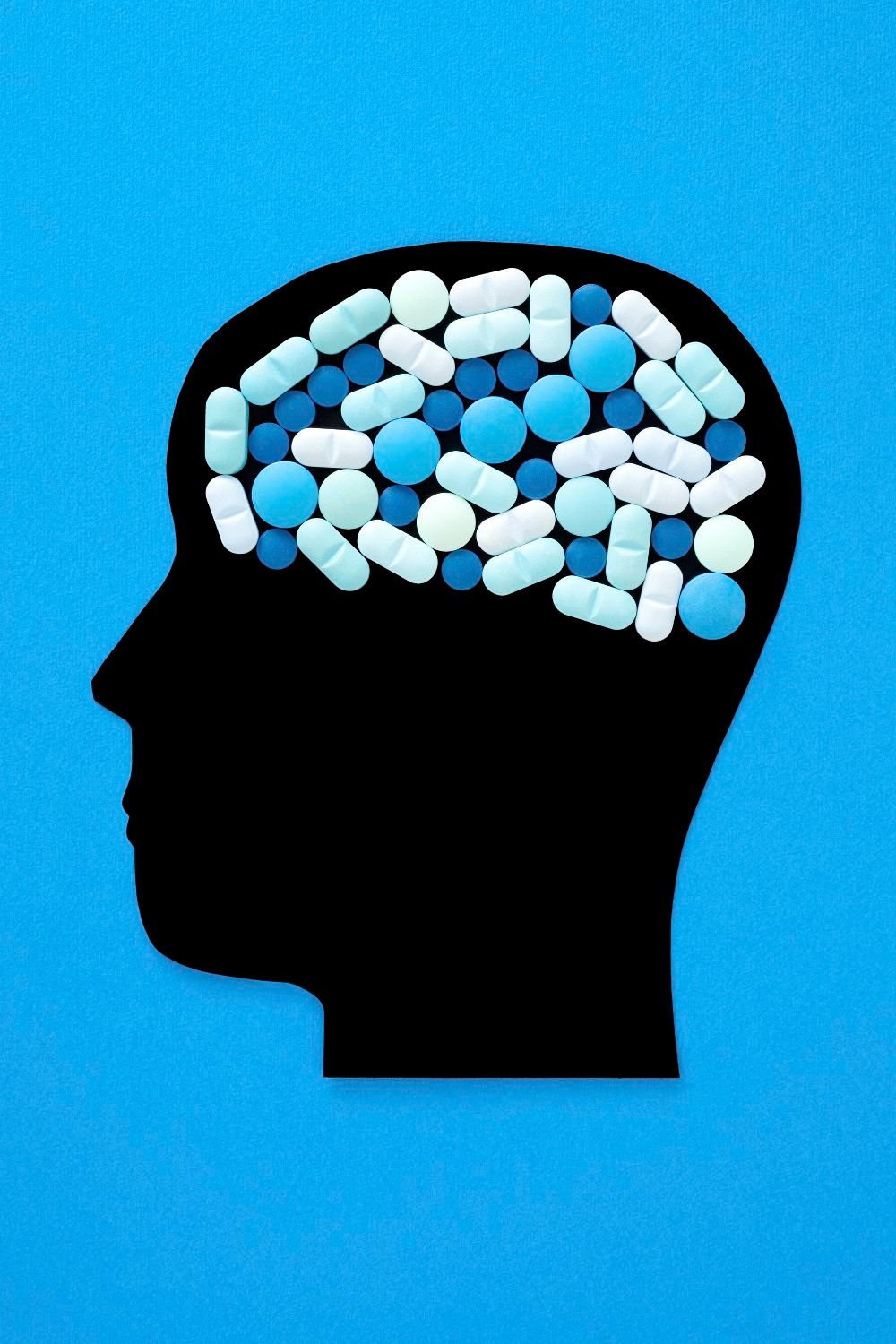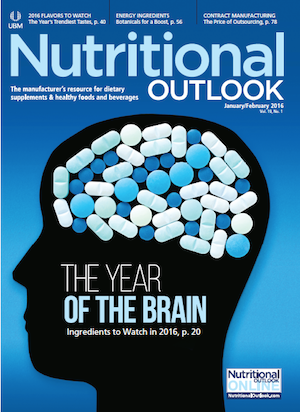2016 Ingredient Trends to Watch for Food, Drinks, and Dietary Supplements: Brain Health Ingredients
Many are pegging this year as the year for brain health.
Photo © iStockphoto.com/FotografiaBasica

If there’s one health concern to keep tabs on in 2016, it’s brain health. With many ingredient advances in the last year alone, and emerging launches in related markets, many are pegging this year as the year for brain health.
Lisa Buono, client insights principal, healthcare vertical, for market researcher IRI, says, “IRI believes that supplements to improve and maintain brain health will grow rapidly because consumers of all ages increasingly have optimal brain health and performance as a desired goal and because supplements may be the only category, at least in the short term, that can provide products to that end.”
IRI, which tracks retail sales in U.S. brick-and-mortar food/drug/mass, club, dollar, and military stores, says sales of supplements specifically marketed for brain health (excluding omega-3) grew nearly threefold last year to $40 million. Notably, this figure does not count sales in specialty stores like GNC or Vitamin Shoppe, nor internet/direct mail or sales of omega-3 products, so sales “are quite likely much higher in total,” Buono says. (If omega-3 products that also make heart-health claims are included, the total could be as high as $400 million, she adds.)
Still, "the staggeringly high growth rate of the brain-health items that we are tracking is quite telling,” she continues. “Consumers want these products, that’s for sure.”
Shoring up brain health is all about prevention as people watch elderly loved ones deal with conditions like dementia or Alzheimer’s disease. Latest U.S. Census Bureau data estimate that by 2050, the 65-and-older population will be double today's size. The time to think about brain health is now, no matter how young the consumer. That is why baby formula, as well as related baby cereal and biscuit products, is still the largest brain-health audience currently, according to Innova Market Insights data.
But other consumer types are wrapping their minds around brain health now. Innova says sports-nutrition powders showed the highest global increase in brain health–related launches in 2015.
There is lots of opportunity here for dietary supplements. “Currently, in the nonprescription spectrum of the market, there are a handful of nutritional supplement brands aimed at brain health, but this area remains largely underserved by the OTC industry,” says IRI in a white paper recently released together with research firm Kline, called “Brain Health: Unlocking White Space Potential for the OTC Industry.”
The paper notes that brain-health supplements are still just a fraction of the total vitamin and mineral supplements market. Some of the supplements already on the market include Cebria by Ever-Neuro Pharma, Prevagen by Quincy Bioscience, Alpha Brain by Onnit Labs, Focus Factor by Factor Nutrition Labs, Procera AVH by Procera Health, and Neuro Sonic (a beverage) by Neuro Drinks. IRI says sales of Prevagen and Procera AVH alone grew nearly 500% and 300%, respectively, in 2015.
Of the many brain-health supplement ingredients available-including ginseng, Ginkgo biloba, omega-3, huperzine A, amino acids, B vitamins, choline, vitamins A, C, D, and E...the list goes on-market researcher Euromonitor International is keeping an eye on several specifically, says Chris Schmidt, senior analyst, consumer health. These include B vitamin nicotinamide, as well as huperzine A and ashwagandha, both of which are in dietary supplements but also expanding into sports. In related news, late last year, Israeli supplier Enzymotec said it is now positioning its phosphatidylserine (PS) ingredient for sports nutrition with a new ingredient, EnzySport. And Innova Market Insights points to vitamin B6 as the top-selling brain-health ingredient, followed by vitamin B12, taurine, choline, and omega-3 fatty acid DHA, respectively.
In fact, it seems like all ingredient suppliers are focusing on brain health these days. In the last year alone, Sabinsa (East Windsor, NJ) introduced a new ingredient, Sabroxy, from the Oroxylum indicum plant, supporting neuronal health. HP Ingredients (Bradenton, FL) launched NeuroActin, an Andrographis paniculata extract with studies supporting cognition. Nutrition 21 (Purchase, NY) presented new clinical results for improved focus and mental clarity for its Nitrosigine bonded arginine silicate. And Frutarom (Switzerland) confirmed new cognitive-function benefit data for its Neuravena green oat ingredient.
As expected, the elderly are a huge focus. Horphag Research has a brand-new study out showing that its Pycnogenol pine bark ingredient may improve cognitive performance in older adults. Kemin (Des Moines, IA) announced results from a study on its Neumentix spearmint extract indicating the ingredient improves elderly cognition. Natreon (New Brunswick, NJ) has a new patent for its Sensoril ashwagandha for dementia-related disorders such as Alzheimer’s Disease, anxiety, and depression. Andrew Wheeler, director of marketing for FutureCeuticals (Momence, IL), says interest is also growing in the company’s NeuroFactor ingredient-a brain-derived neurotrophic factor (BDNF) ingredient from the coffee plant Coffea arabica-following the Framingham Heart Study, which showed higher levels of BDNF may protect against dementia and Alzheimer’s disease.
Elsewhere, Israeli supplier Lipogen (Haifa, Israel) unveiled a new stress-management ingredient last year called Lipogen PSPA, a combination of PS and phosphatidic acid (PA). (For more on relaxation ingredients, read our soon-to-be published story in our January/February 2016 issue.) Kyowa Hakko (New York City) announced an interesting study last year showing benefits of its Cognizin-brand citicoline for improving attention and motor function in young men. Not to be outdone, omega-3 association the Global Organization for EPA and DHA Omega-3s (Salt Lake City, UT) has a new infographic out explaining the cognitive benefits of omega-3.
The list goes on. Even grape juice brand Welch’s, which last year added to its role by becoming a supplier of grape ingredients, is getting in on the action. In December, the company announced a new study indicating its Concord grape juice benefits the brain health of working mothers.
Will marketers take advantage of all this innovation? If they aren’t, they should be.
“There is significant upside market potential in the area of brain health, which remains a largely untapped OTC market with meaningful treatment gaps even in the prescription market as well,” the IRI/Kline white paper states. “White-space opportunity exists that OTC marketers can fill in brain health because demand is critical, with a high number of consumers seeking solutions which are not adequately addressed by currently available OTC or prescription drugs."
"OTCs/nutritional supplements can bridge the gap with products aimed at prevention of dementia/memory loss and that help maintain brain health. There is ample evidence such products will be increasingly demanded by consumers across multiple generations," it concludes.
READ NEXT
Ingredients to Watch 2016: Stevia
Also read:
Low Vitamin D Levels Linked to Faster Cognitive Decline in Older Adults?
Omega-3s May Help Slow Cognitive Decline in Older Adults
Jennifer Grebow
Editor-in-Chief
Nutritional Outlook magazine
jennifer.grebow@ubm.com

Prinova acquires Aplinova to further increase its footprint in Latin America
April 7th 2025Prinova has recently announced the acquisition of Brazilian ingredients distributor Aplinova, which is a provider of specialty ingredients for a range of market segments that include food, beverage, supplements, and personal care.

.png&w=3840&q=75)

.png&w=3840&q=75)



.png&w=3840&q=75)



.png&w=3840&q=75)
























